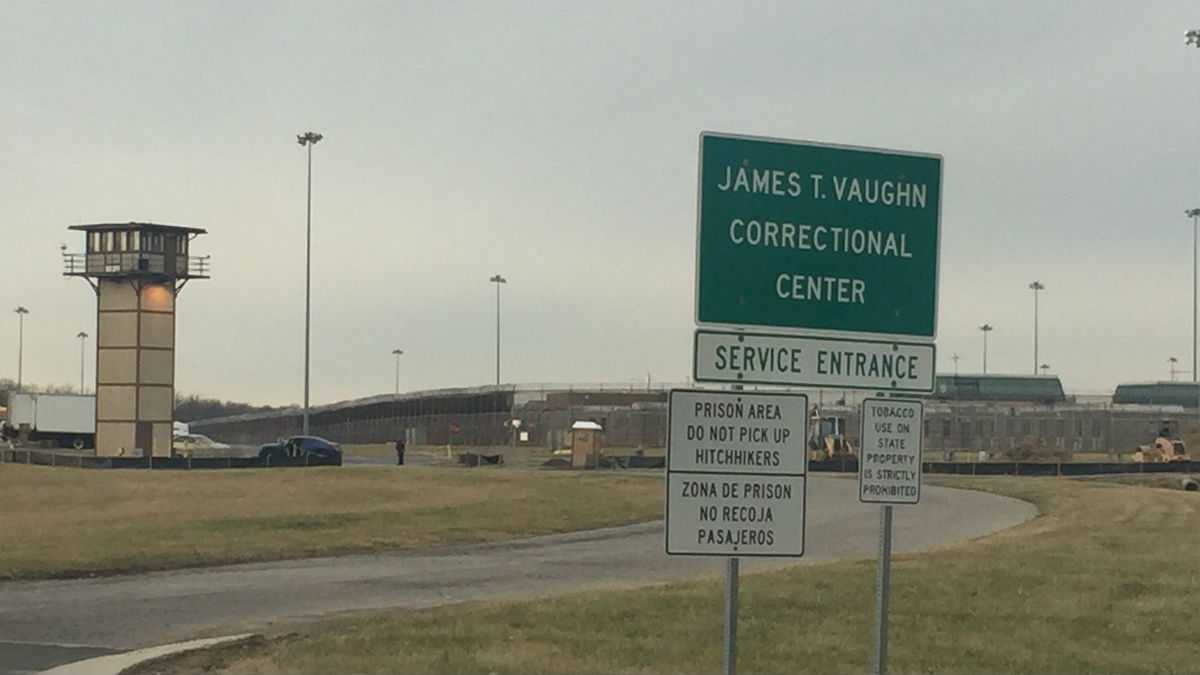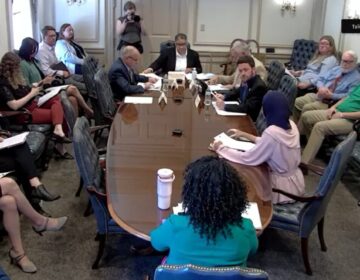Delaware legislators search for answers about prison conditions

Four people are charged with murder, kidnapping and other crimes in the February 2017 riot at James T. Vaughn Correctional Center. (WHYY)
Delaware legislators questioned correction officials during a public hearing Monday.
After a deadly uprising earlier this year, the Delaware legislature is probing prison conditions in the First State.
Department of Correction officials gave testimony Monday during a public hearing in Wilmington that focused on working conditions and safety in Delaware’s prisons.
The event hosted by the state Senate Labor Committee focused on the James T. Vaughn Correctional Center—where a hostage incident leading to the death of Lt. Steven Floyd took place in February.
Legislators questioned correction officials about officer training, rehabilitative resources for inmates, the complaints process, systematic inefficiencies, salaries and staffing shortages.
Staffing at crisis level
Correction officials who testified on Monday said they could not speak to the incident itself, because of the ongoing investigations. However, the answered several questions about Delaware’s prison environment for inmates and staff.
David Pierce, the former warden for the Smyrna prison, testified that several recommendations following the 2004 incident have been put in place, but that more could be done if resources were available.
“The main part of that report that sticks out to me is that there needs to be a mechanism in place that advises the General Assembly and Governor’s office before staffing levels that hit crisis situation,” he said.
“We’re back at the same staffing crisis as we were at before. The [recommendations] that could be done on the ground has been accomplished. But the main situation is the staffing and forced overtime, and frankly, the staff being very tired, which has an effect on training and the communication between staff and inmates and the overall culture.”
Pierce said in 2008 overtime hours were manageable, but that in 2011, overtime became an issue again. Reducing overtime means more time for officer training, and improved communication between officers and inmates—because staff can be in position in specific units, rather than dividing their time between many parts of the prison.
“If you don’t have resources to provide basic needs you can’t resolve the problem,” Pierce said. “The additional level of support and resources need to be part of the equation.”
Commissioner Perry Phelps said a staffing analysis must be completed to know if staffing is an issue, as the number of staff needed for a prison depends on the security of the building, daily operations and the design of the facility.
“That’s why we needed to conduct this study,” he said. “If you don’t have enough staff that could hurt security, not help it.”
Phelps also addressed the concern that salaries are too low, and said retention and interest in the job also must be improved.
“I don’t know what the magic number is, but I know it’s not enough what they make now,” he said. “They deserve a livable wage where they don’t have to work so much overtime to make ends meet.”
State Sen. Robert Marshall, D-Wilmington, who chairs the committee, said the group and Gov. John Carney, D-Delaware, will try to make innovative recommendations to improve inmate conditions and officer safety.
“I think if we had some type of prison industry, where we could generate income earned by the inmates, and if we raised salaries for those who work behind the walls of the prison, it would be a step in the right direction,” he said.
“Cultures of employees are sometimes the problem. Leadership may be the problem. The old ways of doing things may be the problem. And we need to step outside the box the way the academics and reports tell us and try something new.”
Investigations and lawsuits
Since the deadly 18-hour standoff, former inmates and civil rights leaders have been vocal about mistreatment of inmates, while the correctional officer’s union blamed poor staffing for the incident.
Floyd’s family and five other officer hostages also have filed a federal lawsuit against former Govs. Ruth Ann Minner and Jack Markell, and other state officials.
Their attorneys allege poor oversight under the former Democratic governors, and other leaders in the Department of Correction and in the Office of Management and Budget, led to the deadly standoff.
They say for 16 years, requests to install more security cameras and hire more staff were denied, even after recommendations to do so were made following the rape of a counselor at the prison in 2004. Instead, they say the state spent $23 million dollars a year on overtime shifts, forcing officers to work 16 hours a day, in order to save the cost of hiring more staff.
Carney’s fiscal year 2018 budget proposal takes steps to address concerns about low staffing and salaries at Delaware’s correctional institutions. He proposes $4.7 million to increase hazardous pay for correctional officers, $2.3 million for 75 new officers at James T. Vaughn Correctional Center and Baylor Women’s Correctional Institution and $1.3 million for new equipment and training. Correctional officers’ salaries also would increase to more than $37,000.
There’s an ongoing criminal investigation into the hostage incident, the DOC is launching an internal review and the Governor has called for an independent investigation.
During and after the hearing, Marshall said he’s concerned that offenders leaving correctional facilities don’t have enough opportunities to succeed.
“One central theme has been idea of creating opportunities for inmates to be more productive when they leave our institutions, and there may be a narrow window of opportunity that hasn’t happened in 50 years to create some kind of effective, productive job training, skills training, that will lead to a productive life on the outside,” Marshall said.
During testimony, Phelps said the Department of Correction already has opportunities for inmates to learn and grow, but don’t have the resources to conduct all of them. He said the prison has a $1 million-dollar culinary arts center to tech inmates how to run a restaurant, but it can’t be used currently.
“We will do our best with the resources we have to rehabilitate, and make them better citizens so when they go back they will function well,” Phelps said. “But we need the community to work with us. We still need the community, we still need those other places helping those people who are incarcerated be successful citizens when they return.”
Rev. Christopher Bullock, who leads the Delaware Coalition for Prison Reform and Justice, which has been advocating for improved prison conditions for inmates, said the meeting was a positive first step, but the other side needs a platform to be heard.
“Any time you can have a forum with public policy makers open to the community I think it’s a good thing,” he said.
“We need to hear the other side beyond the status quo. I will not be satisfied until we hear from the other side. I’m totally in support of this hearing. I’m not in support of a one-sided perspective coming from the state side. We do need to hear from those who are incarcerated and those who are formerly incarcerated. There are unacceptable behaviors on both sides that need to be addressed. When we get all the information then I think we can have a path towards transformational change and institutional change.”
WHYY is your source for fact-based, in-depth journalism and information. As a nonprofit organization, we rely on financial support from readers like you. Please give today.





